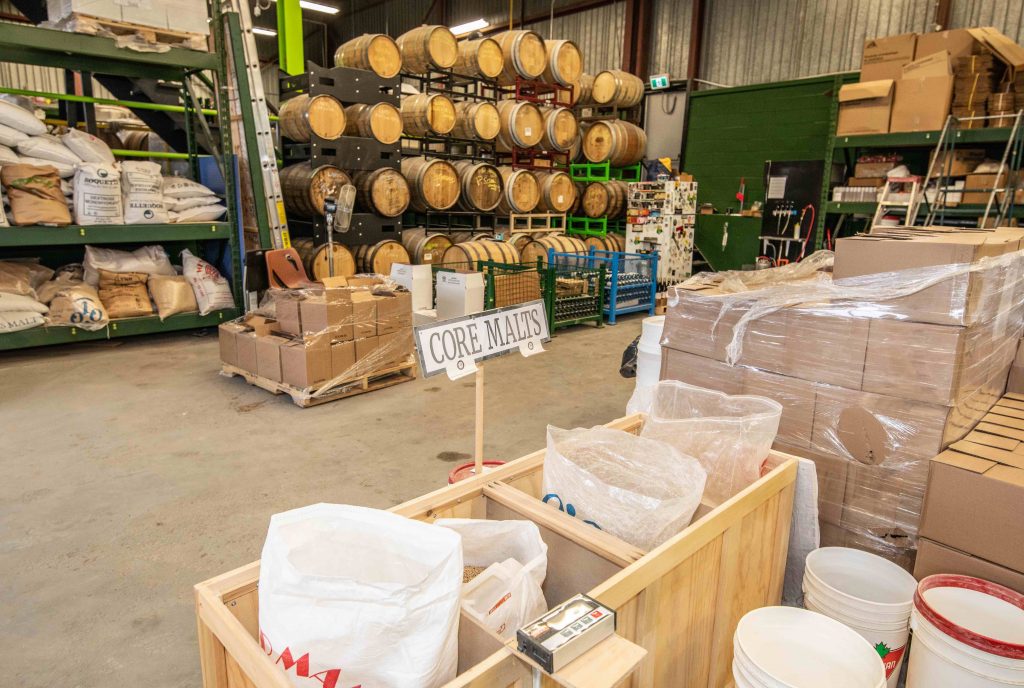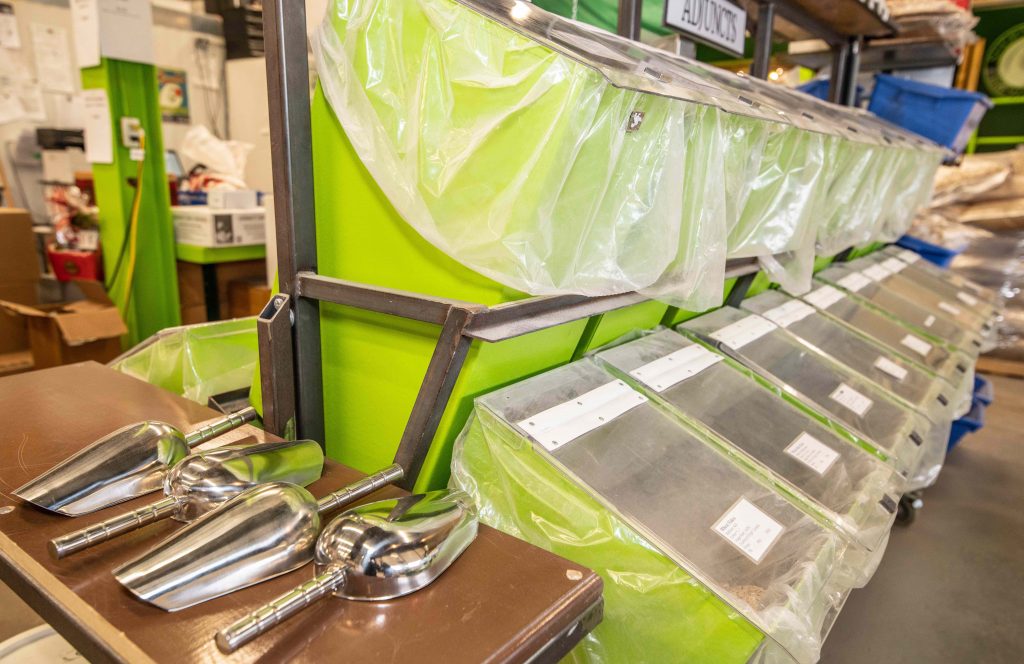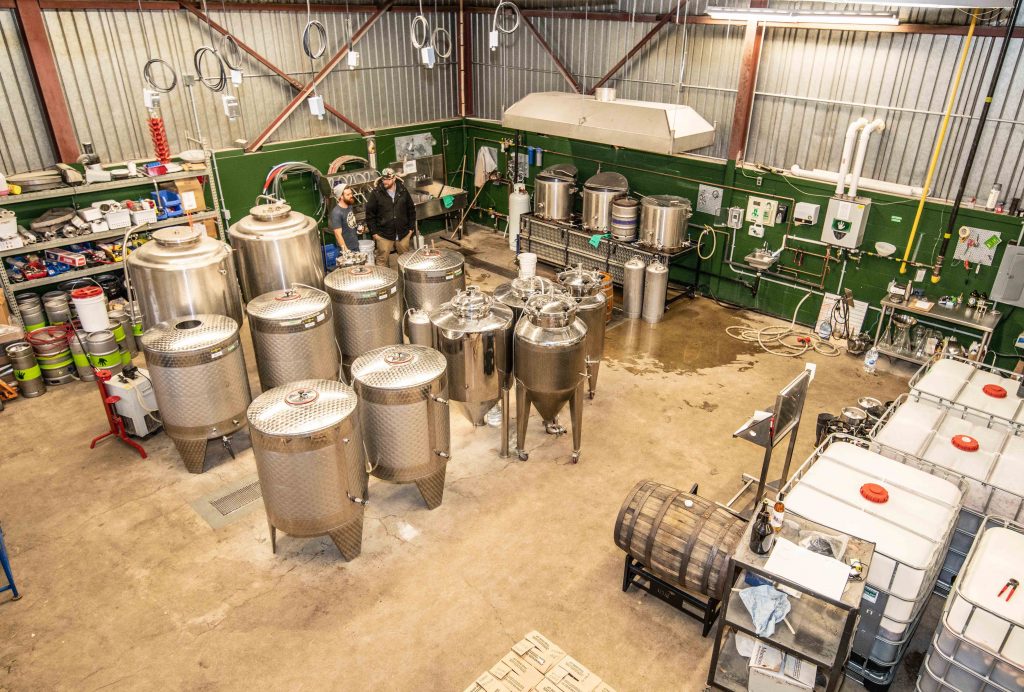
When Rob Hern helped launch Short Finger Brewing Co back in June 2015, it was a statement of intent. A concerted move away from his experiences in large-scale brewing, Rob, along with his wife Kat Rogers-Hern, started their business with the aim of educating, aiding and enabling the homebrewers of Waterloo and beyond. It’s something they’ve gone on to achieve, and it should just so happen that Short Finger brews its own great beers, too.
“I don’t think there’s anyone like us in Canada, that I know of. So we’re definitely unique, but being unique has given me a lot of headaches, too!” laughs Rob Hern, co-owner of Kitchener-based Short Finger Brewing Co.
It’s less than a week until Christmas and Hern is hopeful of getting a few well-earned days off. Whether he’ll get them though, is a different matter. The launch of their own nano brewery earlier in the summer has been followed with plans to offer drinkers the ability to imbibe on-site and take out Hern’s beers. And with that, comes a raft of hurdles to overcome.
“When you are a home-brew supply business, but also one that makes its own beer, nobody really gets what type of company you are,” he explains. “There are many regulations, licences and instances of being categorised the wrong way. It took 15 months to get our business license when starting out, and then you have to do it all again when you want to actually sell beer. It’s like opening a new business all over.”
But don’t mistake Hern’s comments as negative, though. You get the impression such tricky obstacles were expected and are seen as almost character-building, when you’re heading up a business that has no comparable peers for the government and other bodies to match you against.
The Short Finger Brewing Co story began when Hern and Kat Rogers-Hern launched the business as an online store from their home in Waterloo, Ontario back in June 2015. Equipment was stored in their den, and raw ingredients in the basement. The kitchen fridge was stocked with yeast.

Hern considers himself a beer lover, Beer Judge Certification Program (BJCP) certified judge, and avid homebrewer who has been working in the beer industry for nearly ten years.
Before that, he attended Trent University, where he spent his days dreaming of one day opening a small brewery. While there, he managed to pay most of his bills by throwing parties. The quality of his beer has come a long way since the days of pitching yeast at the local brew-your-own facility.
He got his first real taste for brewing under the guidance of Mike Lackey during his time at Great Lake Brewery, where he managed LCBO sales and worked on the 25th Anniversary rebrand.
Hern also spent time working at Horizon Beers, a Belgian beer importer, which had a real impact on his current brewing style. Since starting Short Finger, he has collaborated with several breweries including: Great Lakes, Bar Hop, Indie Ale House, Sawdust City, Half Hours on Earth, Block Three, Barncat Ales, TWB, and more.
The company’s co-founder, Kat Rogers-Hern can be summed up as an educator, librarian, and beer lover. While she was late to the party and didn’t start appreciating beer until her mid-twenties, Rob’s passion and enthusiasm for it were contagious.

As with any good teacher-librarian, she took the academic approach from Day 1, reading everything she could and taking every sensory training course to be found; the more she learned – and sampled – the more she loved it.
Rogers-Hern is a Prud’Homme beer sommelier and certified BJCP judge, and is plunging into the Cicerone certification program.
In these early days of Short Finger Brewing Co, the duo would fulfil orders that were placed online and customers had the option of shipping or local pick-up. Pick-ups happened from the house, which was in the middle of serious renovations. Rather than grab-and-go, it was the norm for homebrewers to stick around for a beer on the back porch or in the kitchen. Homebrewers would also bring bottles by to get feedback from the duo – particularly if they were faced with an off flavour they couldn’t identify.
Wasting no time, the company’s first ‘Homebrew Hangout’ followed a month later at the Bent Elbow in Kitchener. These events were drop-in community building and education events for regional homebrewers. Free to attend, and coupled with a featured talk along with a collaboration brew made by Rob + the night’s speakers, brewers from aforementioned names such as Abe Erb, Block Three, Wellington, Great Lakes, Four Fathers, Barn Cat, TWB, and others have spoken on a wide variety of topics.
In the following weeks and months, the company hosted home brewing classes, competitions and hands-on sessions designed to raise the standard of homebrewing in Ontario.

“After a year of hunting for the right space, we moved into a 1200 square foot retail space just south of downtown,” says Hern. “The shop was a small addition on the back of a much larger unit, which was then-occupied by a major construction company.”
Short Finger secured first right to that space, should it become available down the road. Local pick-ups slowly transitioned down to this new spot while renovations were happening (in its previous life, the shop was a storage garage). Later that summer, the shop officially opened its doors for in-store shopping.
With an eye on growth, Hern convinced the property owner to let him rent said owner’s connected private storage unit, adding an additional 600 square feet to the shop’s footprint. This was renovated for the purpose of building a small brewhouse.
He worked with Greg Smith (working owner at TWB Co-op) to build a custom 3-barrel brewing system. Kat was able to move the Beginner’s Guide to Homebrewing classes and sensory training sessions out of borrowed/rented spaces and into the brewhouse.
Fast forward to early 2018, Rob and Kat were presented with more good news, even if it was a little earlier than they would have anticipated…
While the main building at 20 Hurst Avenue was not originally slated to become available until Spring 2019, AMICO construction decided to move out early and we had to decide pretty much on the spot if they wanted to expand.
The answer was a cautiously optimistic yes.
With 28 days to renovate and move in, it was a tight turnaround. Drains were cut, floors sealed, walls painted, and a massive warehouse party – called Short Can – was thrown on February 9th to help raise money for the transition. Short Finger Brewing Co. closed it’s doors for one extra day over the Family Day weekend to make the move, reopening in its new 6500 square foot location on Wednesday, February 21.

Come June, and much to their relief, all permits were finally in order and Short Finger Brewing Co. launched its bottle shop on the same day as their second annual Solstice is Coming bulk grain sale.
Three barrel-aged styles were released in 375ml bottles, and six beers were offered for growler fills and on draught.
Hern is particularly proud of the beers he produces on his modest, and in his own words, “rudimentary” 4hl system. At the time of writing, brews available to take out include Lando – Batch VB, a blended Sour Saison, which contains a small amount of Lando (A), blended with fresh saison and then matured with mixed field berries harvested from Steckle Heritage Farm. Secondary fermented with a mixed Brett culture from Omega Labs.
Also on offer is Maus, a 3.8% Conditioned Mouse Melon Gose, where Short Finger teamed up with Steckle Heritage Farm to produce a Gose that incorporates fresh-picked coriander seed then aged with freshly picked mouse melons and lemon cucumbers. The beer is conditioned with a special Brett from Escarpment Yeast Labs.
“I’ll be honest, I’m glad with the system I use. It’s small but I know how much work goes into producing these beers and if you’re making beer at whatever volume, you need to know where and how you will be selling it,” he explains.
Through the business, Hern has seen a cross-section of the Ontario brewing industry, from established operations to the professional brewers of tomorrow. And with that, he’s developed a fair idea of what constitutes a solid business plan.
“You see people that are dead set on building 15 or 20bbl systems, or they’re producing a 15bbl batch of Kölsch. That’s fine, but how is that style fairing for other breweries, who will be buying your beer, and where will you be selling it?” He asks. “It is a lot of work to sell beer. I don’t have a taproom or a sales team, so you have to put the effort in. Everyone has their own approach to business, but if you don’t know where the beer you’re brewing is going to go, then I’d worry.”
While Short Finger has undergone steady growth in these last three years, Hern is keen to steady the ship, once their tasting room is complete, of course.
“We have 7,500sqft of space and that’s three times bigger than I ever said this business would be,” he explains. “But I’ve experienced the far greater scale of things when working at Great Lakes, so I’m comfortable with what we have and knowing we won’t grow much more.”
What Hern wants is an environment for people to enjoy their beers, to engage with other drinkers and grow as a result. Ensuring everything was right before opening the business up to others has, partly, come from Hern’s experiences drinking at other brewing operations.
“I’ll be honest, my old rule was to give a new brewery six months to dial their sh*t in. I’d swing by an opening and if there were obvious faults in that brewery’s beers, I’d forgive that and give them time to improve things,” says Hern. “But that approach has changed. With so many breweries opening, there is no need to be so patient. And if that’s my perspective, then you can expect many casual drinkers to adopt a similar attitude. There is so much choice around, why stick with mediocrity?”
With that. Hern believes breweries should no longer be expecting any form of commendation for opting against putting out sub-standard beer.
“If you’re turning to social media to show consumers that you’re pouring out a bad batch of beer, then there’s something very wrong with that,” he says. “It doesn’t happen in any other industry, so why should it happen in beer? If I have to do that, I’m too annoyed that I messed up to be thinking about gratification from social media.”
And with the opening of its tasting room due in 2019, Hern is looking forward to sharing his beers with drinkers of all kinds, growing in the same way Short Finger has helped others over these last three years.
